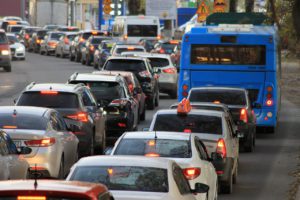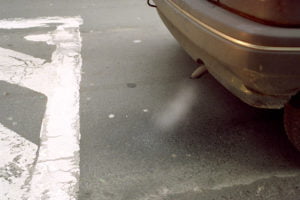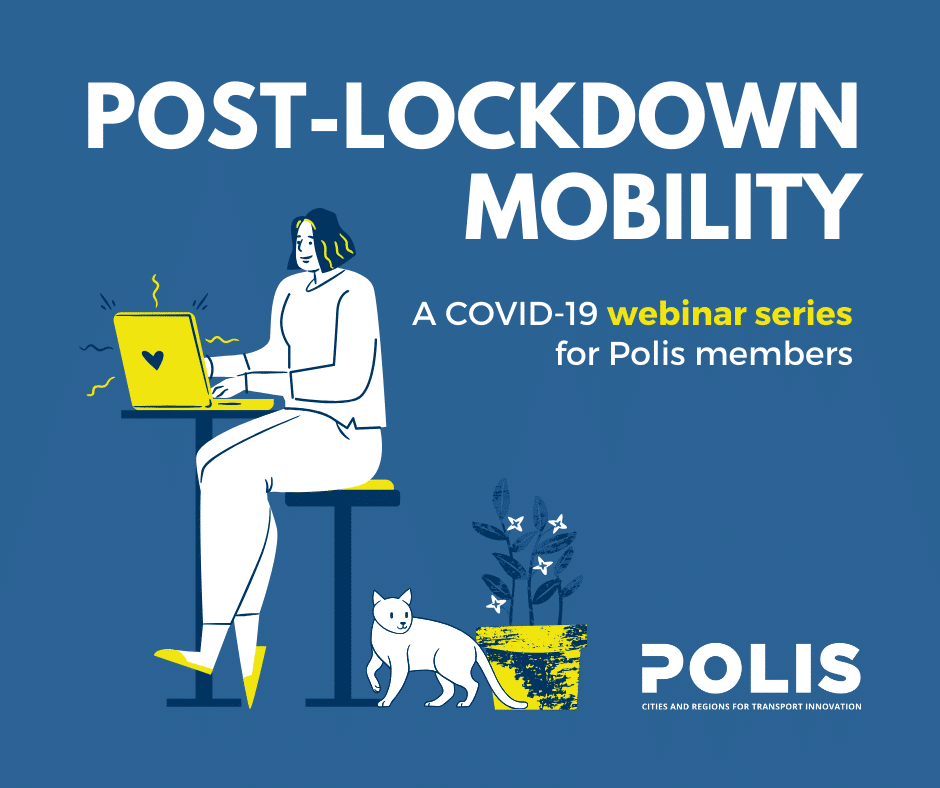Post-Lockdown Mobility webinar report: Air pollution and COVID-19
The session was hosted by Sabina Asanova, Senior Project Manager and Coordinator for Clean Vehicles & Air Quality at POLIS. Air pollution is a major issue for Europe and whilst many cities have experienced cleaner air during the COVID-19 outbreak, there is an increasing need to understand the link between poor air quality and the COVID-19 virus. Early evidence shows that pollution from transport might have played a role in worsening the impact of the virus, highlighting a clear need to reduce pollution not just during COVID-19 but also to deliver long-term health benefits for Europe. Sustainable urban mobility will play a key role in reducing air pollution and solutions are now needed to ensure that cities and regions enjoy good air quality now and in the future
Dario Caro, Tenure-track Researcher at Aarhus University, Leader of Resources Flows in a Circular Economy
Dario presented research being undertaken into the relationship between air pollution and COVID-19. Two key streams of research are underway: The retro-active effects of pollution (the effect of air pollution of COVID-19 fatality rates); and the proactive effects of pollution (the changes in atmospheric pollution as a result of lockdown measures).
The impact of air pollution on COVID-19 fatality rates
Death rates from COVID-19 have varied significantly across Europe and many factors are known to impact these rates, making it difficult to assess the impact of any one factor on the likelihood of fatality or infection. To assess the impact of air pollution, research was undertaken comparing fatality rates in two regions in Northern Italy with high levels of air pollution - Lombardy and Emilia-Romagna - with the rest of Italy. Doing so showed that these regions in Northern Italy had a disproportionately high number of deaths. Research shows that people with pre-existing conditions linked to air pollution are more at risk of serious infection of COVID-19, for example due to weakened immune systems. This demonstrates the dangerous link between air pollution and COVID-19 and highlights the inequalities of the COVID-19 outbreak.
What impact did lockdown have on pollution?
 Dario set out research undertaken investigating the impact of lockdown measures on the greenhouse gas emissions in Italy. The main finding of this research suggests that whilst economic activity has been significantly reduced, greenhouse gas emissions are still persistent and unfortunately cannot be tackled by shutting the activities, but only by rethinking the entire socio-ecological system.
Dario set out research undertaken investigating the impact of lockdown measures on the greenhouse gas emissions in Italy. The main finding of this research suggests that whilst economic activity has been significantly reduced, greenhouse gas emissions are still persistent and unfortunately cannot be tackled by shutting the activities, but only by rethinking the entire socio-ecological system.
Dario concluded by stating that a shift to sustainable modes of transport is needed to improve the health and wellbeing of citizens by reducing air quality and increasing physical activity. Policy makers need to find ways to support sustainable mobility in the months ahead, for example by prioritising active travel and helping people to safely use public transport.
Zoltán Massay-Kosubek, Policy Manager for Clean Air and Sustainable Mobility at the European Public Health Alliance (EPHA)
Zoltán began by providing an overview of the relationship between air pollution and public health. Air pollution can have serious effects on every organ in the body and can even adversely affect unborn children. Many chronic diseases, such as asthma, type 2 diabetes, lung cancer and respiratory infection are known to be caused by or made worse by air pollution.
EPHA has recently been involved with a study on the health costs of transport pollution in European cities. The study by CE  Delft aimed to estimate the social costs of air pollution in cities and investigate the role of transport in this pollution, specifically investigating Particulate Matter (PM), ozone (O3) and nitrogen dioxide (NO2). Air pollution levels in various cities across Europe were monitored, with associated costs calculated for each city. Preliminary results show that roughly two-thirds of the social costs of air pollution come from PM, and around a quarter come from NO2. Around 30% of these pollutants were found to arise from transport, with private cars being the key source. The study estimates that cutting car use by 50% in cities could lead to a consequent 25% fall in air pollution.
Delft aimed to estimate the social costs of air pollution in cities and investigate the role of transport in this pollution, specifically investigating Particulate Matter (PM), ozone (O3) and nitrogen dioxide (NO2). Air pollution levels in various cities across Europe were monitored, with associated costs calculated for each city. Preliminary results show that roughly two-thirds of the social costs of air pollution come from PM, and around a quarter come from NO2. Around 30% of these pollutants were found to arise from transport, with private cars being the key source. The study estimates that cutting car use by 50% in cities could lead to a consequent 25% fall in air pollution.
Zoltán highlighted the need to use this crisis as a chance to reshape transport to create healthier cities. EPHA has recently called for action on safe walking and cycling during COVID-19, including bike lanes, modal filters, shared street space and lower speed limits. Additionally, EPHA has called for support for public transport, encouraging actions such as green public procurement for low emission and electric buses.
Zoltán concluded by highlighting the need for transport and planning policies which help to cut air pollution in cities. Various actions are needed to achieve this, including environmental zones and congestion charging, support for electric vehicles and new parking policies, green procurement for buses, and policies to promote walking and cycling.
Gabriela Barrera, Coordinator for Clean Vehicles and Urban Freight at POLIS
Gabriela provided an overview of the policy landscape in Europe on air pollution and opportunities to reduce air pollution from transport going forward. Opportunity exists to make improvements to existing air quality standards in Europe; for example, the European Union still uses lower air quality standards than those set out by the World Health Organisation. Local authorities are leading the way on taking action on air pollution, but need greater support to improve air quality, particularly from transport. On sustainable mobility, more stringent regulations are needed for petrol and diesel vehicles post-2021. With new EURO standards for vehicles due to come into place, it is vital that various conditions are met, for example making use of the latest technologies, ensuring real-world testing, avoiding delays to legislation, ensuring transparency and independent monitoring of emissions testing, and making manufacturers accountable for the full lifetime of a vehicle.
Gabriela closed by noting that POLIS is part of an expert group of stakeholders currently working on these issues and more, and that a position paper on air pollution is currently being developed. Gabriela invited interested members to get in touch to feed into this discussion. You can contact Gabriela here.
POLIS members can access a recording of the session and all presentations in our Members Area. Further information about the Post-Lockdown Mobility webinar series can be found here.
